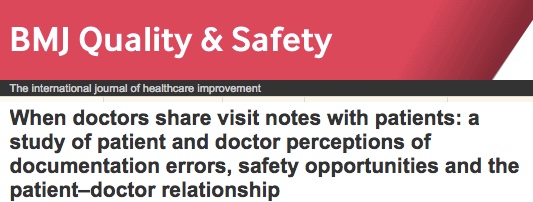 As regular readers know, we’ve written many times about OpenNotes, the project funded by Robert Wood Johnson that blew the doors off of beliefs that bad things happen when patients see their charts. (We blogged about the original results in 2012.)
As regular readers know, we’ve written many times about OpenNotes, the project funded by Robert Wood Johnson that blew the doors off of beliefs that bad things happen when patients see their charts. (We blogged about the original results in 2012.)
Now a new study in BMJ Quality & Safety adds the results of a follow-up survey examining the effects of OpenNotes on the patient-clinician relationship. Excerpts from the abstract (in British English spelling):
Background: Patient advocates and safety experts encourage adoption of transparent health records, but sceptics worry that shared notes may offend patients, erode trust or promote defensive medicine. As electronic health records disseminate, such disparate views fuel policy debates about risks and benefits of sharing visit notes with patients through portals. …
Conclusions: Despite concerns … transparent notes overall did not harm the patient–doctor relationship. Rather, doctors and patients perceived relational benefits. … Traditionally more vulnerable populations … may be particularly likely to feel better about their doctor after reading their notes. … the findings suggest transparent records may improve patient satisfaction, trust and safety.
As we’ve often said, that’s an amazing set of benefits for the simple cultural change of letting patients see what clinicians put in the chart! That’s our point.
The e-patient takeaway:
 Study after study confirms the benefits of OpenNotes. Help change the world: millions of American patients have open notes, but most don’t, nor do most of the world’s patients. So:
Study after study confirms the benefits of OpenNotes. Help change the world: millions of American patients have open notes, but most don’t, nor do most of the world’s patients. So:
- If your providers offer OpenNotes, use them! It’s beneficial and every patient who gets involved helps the profession see that patients really do value access.
- If your providers don’t offer them, ask! Consult our past posts for links to evidence (a summary of them is here), and refer them to the OpenNotes website, which has all the research and a how-to toolkit.
- Bear in mind that medical professionals are trained to pay attention to literature in top journals, because articles there get checked by other professionals. All the OpenNotes literature is in top-tier journals.
- Tell your friends about OpenNotes, so they do this too.






Recent Comments